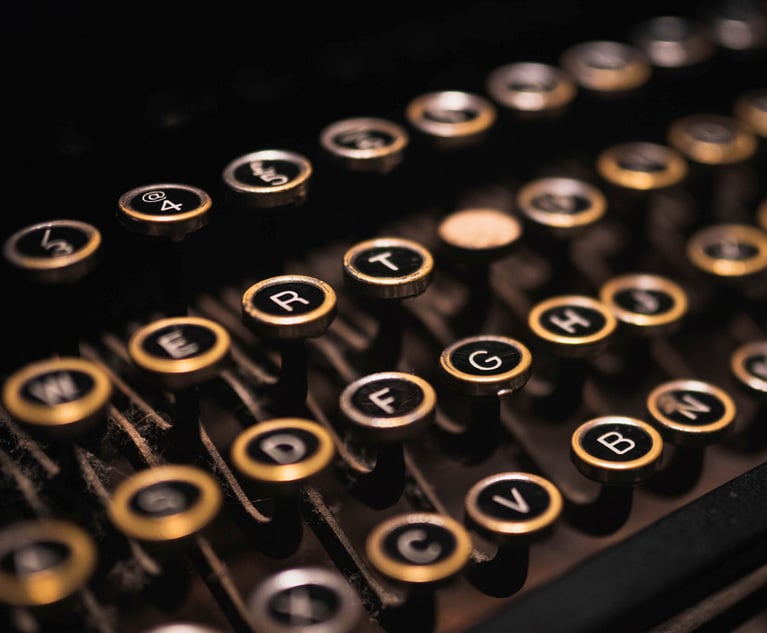 Bill Lee and Harvard University's shield.
Bill Lee and Harvard University's shield.Bill Lee Dissects His Harvard Win
So what's it like to score a win for the Big-H in such a high-profile trial?
October 11, 2019 at 05:57 PM
6 minute read
The war over affirmative action is bound to get nastier in the next few years, but for the moment William Lee, a partner at Wilmer Cutler Pickering Hale and Dorr, is savoring his win for Harvard University.
Earlier this month, federal judge Allison Burroughs ruled that Harvard's undergraduate admissions policy, which considers race as a factor, does not discriminate against Asian Americans. The case was brought by Students for Fair Admissions (SFFA), an anti-affirmative action group spearheaded by Edward Blum.
 So what's it like to score a win for the Big-H in such a high-profile trial? And what did Lee think of Burroughs' long-awaited, 120-page decision? (It took longer than the gestation period for a human baby; the trial concluded last fall and final arguments took place in February.)
So what's it like to score a win for the Big-H in such a high-profile trial? And what did Lee think of Burroughs' long-awaited, 120-page decision? (It took longer than the gestation period for a human baby; the trial concluded last fall and final arguments took place in February.)
Since Lee and his cohort Seth Waxman prevailed, I had little doubt that Lee would say nice things about Burroughs' ruling. That said, I've interviewed Lee numerous times (click here and here) over the years and always found him to be insightful.
But before I get to Lee's postmortem of the trial, may I share a little nugget from Burroughs' decision? Guess who ignited the controversy over Harvard's admission of Asian Americans? New York Times columnist David Brooks. According to Burroughs, Brooks lauded an article by Harvard alum Ron Unz, who accused elite colleges of using "de facto Asian quotas." Brooks picked up that thread, arguing "that stagnant Asian American representation at Harvard between 1995 and 2011 smelled like a quota system," says the ruling.
Sorry for the digression, but who would think a columnist could cause so much trouble?
Without further ado, here's an edited version of my chat with Lee:
Congrats on the win. I have an Oprah-style question: Was it an emotional experience to try the case as both an Asian American and Harvardian (alum and member of the Harvard Corporation)? The fact that I am Chinese American and have deep ties to Harvard made the case special and more challenging in many ways. As a trial lawyer, the key was to set aside those ties and relationships and try the case as best we could.
What did you think of the judge's ruling? Any surprises? Not for us. We thought the opinion was thorough and comprehensive. She understood the statistical evidence, listened very carefully to the witnesses and evaluated their credibility, looking for consistency. It was instructive that she cited the testimony of Harvard students and alums. She listened to people who lived the experience.
Speaking of lived experiences, your side used a highly personalized approach to address the role of race in admissions, the opposite of what the opposing counsel did. I remember Judge Burroughs asking the SFFA's lawyers at the closing arguments why they didn't present an individual plaintiff, and she went back to that point again in her opinion. Bakke, Gruttner and Fisher [the three major affirmative action challenges] all put forth people who claimed discrimination. But this case didn't have a single name attached to it—they didn't identify anyone. SFFA had the full admissions data on 160,000 Harvard applicants over six years and full files on 400 of them, but they didn't pull a single person out from that pile.
So did SFFA make a strategic boo-boo by not producing a real-life plaintiff? They had fine lawyers who litigated robustly. It was less a question of legal strategy but more about the facts. It was hard to prove that Harvard discriminated against Asian Americans, African Americans, whites, sparse country individuals, or anyone else because the admissions process is designed with checks and balances. The process involves 40 people who sit in a room voting on applicants.
You say Harvard benefited from the facts. But not all the facts that spilled out were flattering. I'm thinking of the big admissions boost enjoyed by athletes and children of alumni, big donors and faculty, the group that's called A.L.D.C. That's true. It wasn't all positive. But that preference for legacies, athletes, etc. was out there, long before the case. It's on the admissions information page.
Yes, but the case unveiled the gory details. I'm curious: Do you think the Varsity Blues college admissions scandal that broke out affected people's view of the Harvard case? I know that's a totally different matter, but it suggested to me that the admissions process is rigged and fairness goes beyond race considerations. Varsity Blues and Harvard are unrelated, although the interest in both matters reflected the intense public interest in college admissions. Harvard was not part of [college consultant] Rick Singer's scandal. We weren't implicated because the 40-person review process made it unlikely. People are so wound up about where their kids go to college. That's a problem and it manifests itself in the intense interest in Varsity Blue and our case.
This content has been archived. It is available through our partners, LexisNexis® and Bloomberg Law.
To view this content, please continue to their sites.
Not a Lexis Subscriber?
Subscribe Now
Not a Bloomberg Law Subscriber?
Subscribe Now
NOT FOR REPRINT
© 2025 ALM Global, LLC, All Rights Reserved. Request academic re-use from www.copyright.com. All other uses, submit a request to [email protected]. For more information visit Asset & Logo Licensing.
You Might Like
View All

Letter From London: 5 Predictions for Big Law in 2025, Plus 5 More Risky Ones
6 minute readTrending Stories
- 1What to Know About the New 'Overlapping Directorship' Antitrust Development
- 2'Quiet, Appropriate End:' NY Court of Appeals Formally Removes Erin Gall From Bench
- 3Just One Cookie? Justices to Decide Liability for Half-Truths
- 440% Contingency: A New Ruling Just Cost This Plaintiff Team $827K in Legal Fees
- 5Runners-Up and Shout-Outs for Litigator of the Week
Who Got The Work
Michael G. Bongiorno, Andrew Scott Dulberg and Elizabeth E. Driscoll from Wilmer Cutler Pickering Hale and Dorr have stepped in to represent Symbotic Inc., an A.I.-enabled technology platform that focuses on increasing supply chain efficiency, and other defendants in a pending shareholder derivative lawsuit. The case, filed Oct. 2 in Massachusetts District Court by the Brown Law Firm on behalf of Stephen Austen, accuses certain officers and directors of misleading investors in regard to Symbotic's potential for margin growth by failing to disclose that the company was not equipped to timely deploy its systems or manage expenses through project delays. The case, assigned to U.S. District Judge Nathaniel M. Gorton, is 1:24-cv-12522, Austen v. Cohen et al.
Who Got The Work
Edmund Polubinski and Marie Killmond of Davis Polk & Wardwell have entered appearances for data platform software development company MongoDB and other defendants in a pending shareholder derivative lawsuit. The action, filed Oct. 7 in New York Southern District Court by the Brown Law Firm, accuses the company's directors and/or officers of falsely expressing confidence in the company’s restructuring of its sales incentive plan and downplaying the severity of decreases in its upfront commitments. The case is 1:24-cv-07594, Roy v. Ittycheria et al.
Who Got The Work
Amy O. Bruchs and Kurt F. Ellison of Michael Best & Friedrich have entered appearances for Epic Systems Corp. in a pending employment discrimination lawsuit. The suit was filed Sept. 7 in Wisconsin Western District Court by Levine Eisberner LLC and Siri & Glimstad on behalf of a project manager who claims that he was wrongfully terminated after applying for a religious exemption to the defendant's COVID-19 vaccine mandate. The case, assigned to U.S. Magistrate Judge Anita Marie Boor, is 3:24-cv-00630, Secker, Nathan v. Epic Systems Corporation.
Who Got The Work
David X. Sullivan, Thomas J. Finn and Gregory A. Hall from McCarter & English have entered appearances for Sunrun Installation Services in a pending civil rights lawsuit. The complaint was filed Sept. 4 in Connecticut District Court by attorney Robert M. Berke on behalf of former employee George Edward Steins, who was arrested and charged with employing an unregistered home improvement salesperson. The complaint alleges that had Sunrun informed the Connecticut Department of Consumer Protection that the plaintiff's employment had ended in 2017 and that he no longer held Sunrun's home improvement contractor license, he would not have been hit with charges, which were dismissed in May 2024. The case, assigned to U.S. District Judge Jeffrey A. Meyer, is 3:24-cv-01423, Steins v. Sunrun, Inc. et al.
Who Got The Work
Greenberg Traurig shareholder Joshua L. Raskin has entered an appearance for boohoo.com UK Ltd. in a pending patent infringement lawsuit. The suit, filed Sept. 3 in Texas Eastern District Court by Rozier Hardt McDonough on behalf of Alto Dynamics, asserts five patents related to an online shopping platform. The case, assigned to U.S. District Judge Rodney Gilstrap, is 2:24-cv-00719, Alto Dynamics, LLC v. boohoo.com UK Limited.
Featured Firms
Law Offices of Gary Martin Hays & Associates, P.C.
(470) 294-1674
Law Offices of Mark E. Salomone
(857) 444-6468
Smith & Hassler
(713) 739-1250











